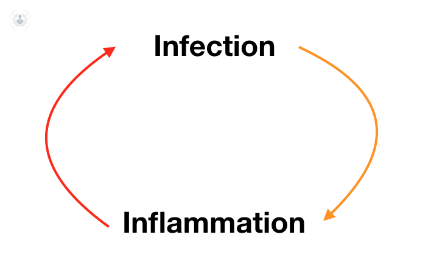Why do I keep getting urinary tract infections? Recurrent UTIs in women
Written by:Urinary tract infections (UTIs) are never fun, with patients suffering pain while urinating, frequent trips to the toilet, and abdominal pain. The worst part is that some people seem to get them again and again. What causes recurrent UTIs? Expert urologist Mr Ali Omar provides answers to this common problem.

Recurrent UTIs in women are a common presentation in both GP and urology practices. The risk of a woman developing a UTI over her lifetime is about 50 per cent and 25 per cent of this group will experience a further infection within the next six months. Recurrent UTIs can be defined as 2 to 3 proven infections in the prior 6 to 12 months. Symptoms include urinary frequency and urgency, pain on urination and also lower abdominal pain.
The most common infecting organism is Escherichia coli (E.coli) in a patient with a normal urological tract and no other complicating factors. In other circumstances, Proteus, Klebsiella and Pseudomonas may be the source of the problem: this latter group is often associated with other comorbidities including infection (struvite) stones in the upper renal tract.
What causes recurrent UTIs in women?
The female urethra (exit tube from the bladder) is a lot shorter than in males, enabling bacteria to enter the bladder and cause infection. Causes include:
- Sexual intercourse (particularly frequent intercourse, a new sexual partner and spermicide use). This is the most common cause of uncomplicated UTI in women.
- Incomplete emptying of the bladder (urethral narrowing, neurological causes).
- Pregnancy
- A history of kidney stones.
- Other medical conditions, such as diabetes, chronic kidney disease (CKD), immunosuppression states, etc.
- Instrumentation and external factors (catheterisation, stents in situ, post-cystoscopy, etc.).
How are recurrent UTIs diagnosed?
- Urine culture at the time of a UTI
- Flexible cystoscopy examination to exclude any obvious cause from within the bladder
- Ultrasound or CT imaging – usually reserved for complicated infections, blood in the urine (haematuria), and kidney infection (pyelonephritis).
What happens with recurrent UTIs at microscopic level?
The internal lining of the bladder is usually resistant to attack from infecting organisms. One component of this bladder wall resistance is the glycosaminoglycan (GAG) layer, which acts as a natural barrier to infection. During a UTI, bacteria can attach and damage the GAG layer, causing breaches in the internal bladder lining. It has been proposed that this microscopic damage will allow bacteria to cause inflammation within the bladder wall and as a result, an infection/inflammation cycle is initiated that can lead to the recurrent UTI scenario.

Patients who present with painful bladder syndrome and interstitial cystitis are possibly affected in a similar way, with inflammation of the bladder wall caused by infection. This has not been proven to date; however, it remains a plausible hypothesis.
How are recurrent UTIs treated?
Lifestyle choices
There are simple actions that can help to prevent recurrent UTIs, such as:
- Complete bladder emptying
- Good fluid intake
- Passing urine after sexual intercourse
- Avoid perfumed soaps
Antibiotics
Once a UTI has been diagnosed, the first line of treatment is usually a course of antibiotics. The antibiotics of initial choice may be oral trimethoprim, nitrofurantoin or cefalexin. This is usually an empirical course in the first instance. A mid-stream urine (MSU) test is carried out at this time to check that the antibiotic sensitivity is correct. Complicated or resistant infections may be treated with antibiotics depending on sensitivities.
Bladder instillation therapy
Hyaluronic acid and chondroitin sulphate are both treatments that can be administered into the bladder that replace the damaged GAG layer with a natural substitute (Cystistat® or iAluRil®). A small catheter is passed into the bladder and removed once the fluid has been syringed into the bladder. This is an outpatient procedure that, over time, will break the infection/inflammation cycle, thereby reducing the risk of future infections. It is initially given as a course over six weeks which is then extended to fortnightly and/or monthly instillations, depending upon response.
Surgical options
The commonest reason for offering surgery is to improve emptying of the bladder due to urethral narrowing. This is a simple day-case procedure that is carried out under a short general anaesthetic. Side effects are rare and this procedure can be used in conjunction with instillation therapy to give excellent results in preventing further infections.
More complex surgery is usually directed at any underlying causes of recurrent UTI, such as kidney stones or anatomical abnormalities found during the course of investigations.
Mr Ali Omar is a consultant urologist and surgeon with over 15 years of experience. If you would like to book a consultation with him, you can do so today via his Top Doctors profile.


